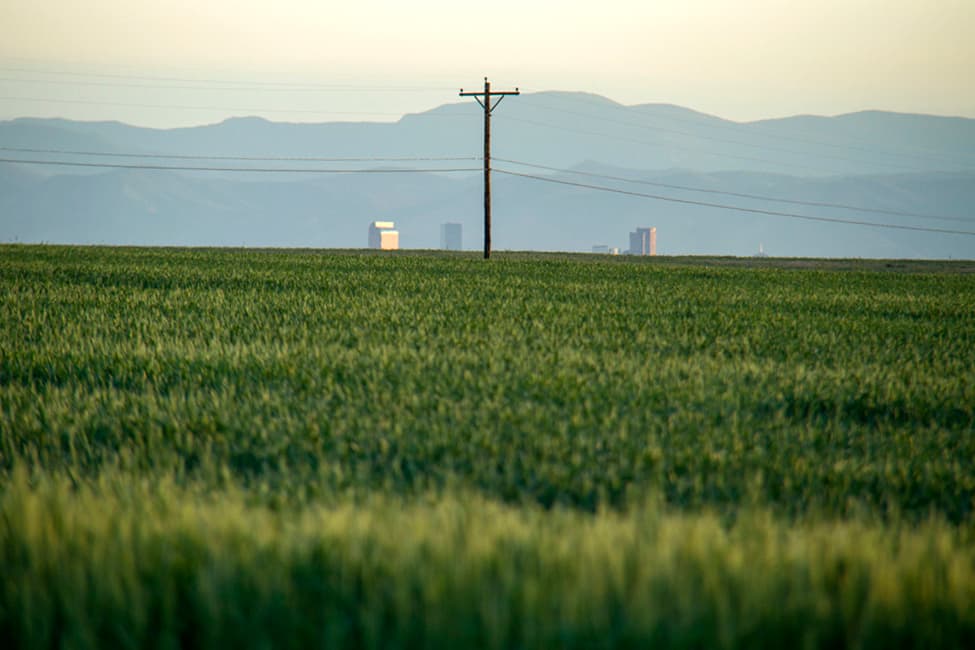Republican gubernatorial candidate Walker Stapleton committed himself to keep Colorado’s agricultural industry thriving as it faces challenges imposed by President Donald Trump’s economic policies following a roundtable meeting with representatives from agriculture groups Thursday.
Stapleton, Colorado's state treasurer, stopped short of outright denouncing certain Trump policies, but nevertheless suggested during a press conference following the meeting that he would try to limit the effects the federal government’s policies have on Colorado’s agricultural industry.
Stapleton said he's reached out to U.S. Sen. Cory Gardner about addressing concerns with Trump's tariffs. He said he hasn't yet reached out to U.S. Secretary of Agriculture Sonny Perdue.
“I will stand up when I think that there are policies in the federal level which may damage Colorado’s future, and in this case, particularly our agriculture industry,” Stapleton said. He added, "As governor, I am absolutely willing to engage with the White House to try and stand up for Colorado farmers."
Stapleton's comments on Thursday were a departure from his usual praise for Trump. Stapleton touted his support for Trump's tax plan throughout his primary campaign
Even if the event wasn’t a repudiation of the president, distancing himself from President Trump could be something Stapleton is starting consider, if he takes polling seriously.
A Morning Consult report updated this month shows President Trump’s approval ratings in Colorado have dropped since his inauguration in January 2017. The report showed Trump has a 55 percent disapproval rate as of June, compared to 44 percent in January 2017. President Trump's current approval rating sits at 42 percent in the state, according to the report
Denver-based independent pollster Floyd Ciruli put the results in perspective on his blog Thursday: “With a negative 13-point rating, Trump is unlikely to be of much help to Colorado Republican candidates in competitive races.”
Stapleton said agriculture is “indispensable” to the kind of economy he said everyone wants in the state. He also said the industry is responsible for some 170,000 jobs and contributes roughly $40 billion to the state’s economy. Since they were announced earlier this year, there were concerns about the effect tariffs on steel and aluminum could have in the state.
“I want to make sure that I am a governor who stands up for the agriculture industry in Colorado,” Stapleton said. “I have said continuously that I will work with Washington and the administration on policies that I think would be a benefit to Colorado and our collective economic future.”
Colorado currently exports about $8 billion worth of goods, with agriculture responsible for about a quarter of those exports, Stapleton said. A majority of those exports are meat-related, he said, with the state exporting more than $600 million worth of beef exports to China alone.
“I am considered that an escalating trade war with China will have negative economic consequences for the meat industry in Colorado,” Stapleton said.
He added that the tariffs placed by Trump’s administration have caused a 15 to 20 percent reduction in the price of corn and wheat in the state at a time when farmers could least afford it.
“I think the biggest concerns are trade is not and shouldn’t be a zero sum game,” Stapleton said. “If you look at the president’s decision to ... put steel tariffs in place, I think the intent of that decision was to support the return of the steel industry to our country.”
Tariffs placed on dairy products from China and Mexico in response to the steel tariffs lead to, “adverse consequences to our dairy industry in the state of Colorado,” Stapleton said.

There were representatives from at least 15 different agricultural groups in the state who discussed trade and its impact in Colorado. The meeting gave Stapleton a chance to hear directly from people (and potential voters) from Colorado’s rural areas.
It was held at the headquarters of the Colorado Farm Bureau, a statewide organization made up of people in the agricultural industry like ranchers and farmers. One the members of its board of director, Marc Arnusch, attended Thursday’s roundtable with Stapleton.
Arnusch is a Weld County-based farmer who grows wheat and barley seed for the craft brewery industry. He said Colorado does a good job of overproducing things like wheat, corn and dairy, but there needs to be a mechanism in place to get these goods to market.
"In Colorado, there's a lot of things that are really important to farmers and ranchers, and first and foremost is having access to markets," Arnusch said. "(Stapleton) talked specifically about trying to do what's right by Colorado to open up these channels of trade."











